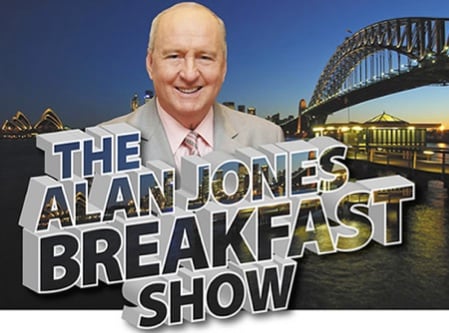The ACMA has found 2GB to be in breach of accuracy guidelines, during the Alan Jones breakfast show.
“Harbour Radio Pty Limited, the licensee of Sydney radio station 2GB, breached the accuracy obligations in the Commercial Radio Australia Codes of Practice 2011 in two broadcasts of the Alan Jones Breakfast Show,” according to an ACMA ruling released today.
This is not the first time Jones has been rapped over the knuckles for inaccuracy. As we reported in June last year, 2GB was forced to review it’s compliance processes across all its production teams, concerning factual accuracy and the presentation of ‘significant viewpoints’ after ACMA found it in breach (see Alan Jones’ response here). A more recent accuracy breach was also delivered to Ray Hadley earlier this month.
Code 2.2(a) requires licensees, in the preparation and presentation of current affairs programs, to use reasonable efforts to ensure that factual material is reasonably supportable as being accurate.
The Australian Communications and Media Authority found 2GB did not make reasonable efforts to ensure the accuracy of:
- comments made by Mr Jones on 17 October 2012 about power station closures (Investigation 2962). Here, the sources relied on by 2GB were contradicted by primary material readily available on the website of the owner of the power stations, and
- comments made by Mr Jones on 23 October 2012 about salaries paid in the Department of Climate Change (Investigations 2952, 2953 and 2954). Here, there was no evidence of 2GB’s efforts to ensure the accuracy of the comments.
Power station case:
On 17 October 2012, Jones discussed a story that had been reported in the media that morning about the shutting down of the Yallourn power station. Subsequent to this he took a phone call from a listener, the complainant, who challenged the accuracy of a number of his statements. Shortly after the call was terminated Jones returned to air and quoted a media article in defence of his original assertion. These three segments were the subject of this investigation.
The other three cases: Mines, Government Spending and the US Economy
Broadcast of 23/10/12 – Government expenditure (public service salaries in Department of Climate Change)
Broadcast of 24/10/12 – US economy
This complaint was not upheld. The ACMA decided that 2GB did not breach the Code in this case. The ACMA found the comments broadcast were statements of opinion. The ‘accuracy’ obligation in the codes applies only to factual material.
The ACMA also found two breaches by 2GB of its complaints-handling obligations. In Investigations 2952, 2953 and 2954, 2GB submitted that it was not obliged to respond to a complaint it considered frivolous, vexatious or an abuse of the complaints process. The ACMA did not accept this submission as the Codes require licensees to provide a substantive response to a complaint, including information about the complainant’s right to refer the matter to the ACMA.
In Investigations 2947 and 2960, 2GB submitted that it did not receive the complaint. However, the complainant provided the ACMA with a fax transmission report showing that the complaint had been successfully sent to 2GB. In these two matters the ACMA found that 2GB was obliged to give a substantive response and breached the code when it failed to do so.
The ACMA is in discussions with 2GB about remedial measures.

